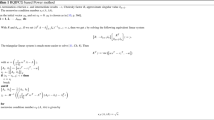Abstract
This paper contributes to the solution of the non-negative least squares problem (NNLS). The NNLS problem constitutes a substantial part of many computer vision methods and methods in other fields, too. We propose a novel sequential coordinate-wise algorithm which is easy to implement and it is able to cope with large scale problems. We also derive stopping conditions which allow to control the distance of the solution found to the optimal one in terms of the optimized objective function. The proposed algorithm showed promising performance in comparison to the projected Landweber method.
Preview
Unable to display preview. Download preview PDF.
Similar content being viewed by others
References
Basri, R., Jacobs, D.W.: Lambertian reflectance and linear subspaces. IEEE Transactions on Pattern Analysis and Machine Inteligence 25(2), 218–233 (2003)
Bertero, M., Boccacci, P.: Introduction to Inverse Problems in Imaging. Institute of Physics Publishing, Bristol (1998)
Boyd, J.E., Meloche, J.: Evaluation of statistical and multiple-hypothesis tracking for video surveillance. Machine Vision and Applications 13(5-6), 244–351 (2003)
Fletcher, R.: Practical Methods of Optimization, 2nd edn. John Wiley & Sons, New York (1990)
Granlund, G.: An associative perception-action structure using a localized space variant information representation. In: Proceedings of Algebraic Frames for the Perception-Action cycle (AFPAC), Kiel, Germany (September 2000)
Johansson, B., Elfving, T., Kozlov, V., Censor, T., Granlund, G.: The application of an oblique-projected Landweber method to a model of supervised learning. Technical Report LiTH-ISY-R-2623, Dept. EE, Linköping University, SE-581 83 Linköping, Sweden (September 2004)
Lawson, C.L., Hanson, R.J.: Solving Least Squares Problems. Prentice-Hall, Englewood Cliffs (1995)
Author information
Authors and Affiliations
Editor information
Editors and Affiliations
Rights and permissions
Copyright information
© 2005 Springer-Verlag Berlin Heidelberg
About this paper
Cite this paper
Franc, V., Hlaváč, V., Navara, M. (2005). Sequential Coordinate-Wise Algorithm for the Non-negative Least Squares Problem. In: Gagalowicz, A., Philips, W. (eds) Computer Analysis of Images and Patterns. CAIP 2005. Lecture Notes in Computer Science, vol 3691. Springer, Berlin, Heidelberg. https://doi.org/10.1007/11556121_50
Download citation
DOI: https://doi.org/10.1007/11556121_50
Publisher Name: Springer, Berlin, Heidelberg
Print ISBN: 978-3-540-28969-2
Online ISBN: 978-3-540-32011-1
eBook Packages: Computer ScienceComputer Science (R0)




